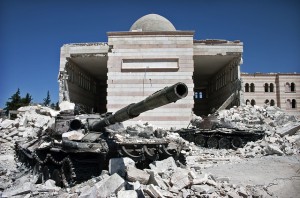This last week the world was horrified to watch a video of the Jordanian pilot Moaz al-Kasasbeh being burned alive in a cage by his ISIS captors. The latest and most sophisticated of a long series of ISIS brutality episodes indicates that ISIS is more ruthless and more organized than any of the coalition countries seems to have anticipated. Religious fanatics like the ISIS fighters are willing to do anything to swell their numbers and expand their borders in eastern Syria and northern Iraq. The United States and the other coalition countries must organize a concentrated and well-funded campaign to destroy this massive terrorist cell before its power expands and it launches more devastating attacks on other countries.

But the reason why I am writing today is not to call for the destruction of ISIS. Rather, I want to argue that the reasoning that ISIS employed in order to justify this latest killing is similar, startlingly so, to the reasoning that is employed by many Americans when they defend the torture methods that have been used in recent years at Guantanamo. It also is a form of reasoning that is foreign to the classical Christian faith.
Moaz al-Kasasbeh was an enemy of ISIS who was at war with them and was actively seeking to harm their interests by raining bombs upon their fortifications and fighters. When ISIS captured him they viewed him as a POW and, using means-based reasoning, they sought to use his life for their own wartime purposes. As a captive he was no longer able actively to harm ISIS. But in violating his humanity and destroying his life, ISIS indicated that his life as an imprisoned captive was of less importance to them than the possibility of recruiting more Jihadist fighters for their cause. The main reasons why ISIS publicized the video – spreading fear and recruiting more Jihadists – were weighty enough in their minds to overwhelm any feeble respect they might otherwise have had for the preservation of his life as a POW.
Now for the similarity. The terrorists who the United States has held at Guantanamo in recent years are likewise enemies of the United States who have put themselves at war with this country and who have actively sought to harm this country by slaughtering large numbers of its people. Their cause is despicable and in my mind they are POWs whose rights ought to be limited by virtue of the way in which they have sought to make war upon the United States. Yet in torturing some (or many) of them at Guantanamo the United States has decided to employ means-based reasoning to use their lives for America’s own wartime purposes. As captives they are no longer able to harm the United States. In violating their humanity via waterboarding and similar tortures the United States is indicating that their lives and welfare as prisoners are of less importance than the possibility of extracting informational confessions that will advance America’s war on terror. The main reason why American officials have been torturing these prisoners – extracting their information – is weighty enough in the minds of the Americans to overwhelm any respect they might otherwise have had for the humanity of such persons. ISIS uses consequentialist reasoning and America is using consequentialist reasoning too.
But, it might be argued, al-Kasasbeh was brutalized and America is just waterboarding. Unfortunately, ‘just waterboarding’ is far worse than you think. In the United States we do not publicize what goes on at Guantanamo. It is all done in secret, not televised live from a reality show that is being filmed on the Washington Mall. According to Wikipedia, “waterboarding is a form…of water torture, in which water is poured over a cloth covering the face and breathing passages of an immobilized captive, causing the individual to experience the sensation of drowning. Waterboarding can cause extreme pain, dry drowning, damage to lungs, brain damage from oxygen deprivation, other physical injuries including broken bones due to struggling against restraints, lasting psychological damage, and death. Adverse physical consequences can manifest themselves months after the event, while psychological effects can last for years.” Christopher Hitchens, for an article entitled ‘Believe Me, It’s Torture,’ was voluntarily waterboarded. His experience was that “You feel that you are drowning because you are drowning—or, rather, being drowned, albeit slowly and under controlled conditions and at the mercy (or otherwise) of those who are applying the pressure.” Now if America was performing this kind of torture for a worldwide reality video, on the Washington Mall in front of the Capitol, I can almost guarantee you that the outrage would be similar to the outrage that is currently targeting ISIS. The world would see America as a state that is violating the humanity of its POWs for the sake of other ends that it considers to be more important than fundamental moral principles.
But, it might be argued, al-Kasasbeh is dead and the waterboarded prisoners are still alive. Surely this indicates a difference between America and ISIS. I agree, it does. This is one area where there does seem to be a major difference between America and ISIS. Death is undoubtedly a worse evil than an experience of great pain and a life of physical damage. Yet the reason why the world is horrified right now by al-Kasasbeh’s death is not the fact that he is dead. It is rather that the way in which he died is so strange, dramatic, and painful. It is the horror and pain of al-Kasasbeh’s death that has fascinated the world – not necessarily the death itself. If ISIS had discretely injected al-Kasasbeh with a toxic Pentobarbital solution, painlessly and behind closed doors, the news story would have ended almost immediately in the world’s consciousness. Now if America were openly waterboarding its prisoners on the Washington Mall, the part of the story that would horrify the world would also be the drama and pain. Pain, in the modern world, has come to seem for many of us to be a worse evil than death – and that is largely what fascinates us about the al-Kasasbeh story.
Now, many in the just war tradition would argue that when the cause of the war is just then the ethical status of the means that are employed in that war gets modified in some way. I agree with this and it does certainly seem that the decision of the Allies in World War Two to bomb Dresden or Nagasaki was made more tolerable – although perhaps not justified – by virtue of the fact that the Allies were fighting such a great evil. Undoubtedly, in my view, the United States stands for a world order that is vastly superior to that of ISIS. Let me stress that again – the ends that are sought by the United States are unimaginably better than the ends sought by ISIS. But from this some might argue that terrorism is a great evil, and ergo that unsavory torture measures in order to defeat terrorism are justified. This is precisely where we get into the dangerous territory that I am highlighting. What exactly gets justified under this line of reasoning?
The point remains that at the end of the day the fact that al-Kasasbeh is dead and the waterboarded prisoners are still alive does not make the core reasoning of ISIS and American officials as different as you might think. America too has been violating the humanity of its prisoners. The fact that America does its dirty work behind closed doors does not make its reasoning any less consequentialist than the reasoning of the ISIS fighters. This reasoning is foreign to classical Christian faith and it arose primarily among Utilitarians, in the post-Enlightenment era. Many Christians have recently noted the absence of this reasoning in Christian history. Joe Carter, Director of Communications for the Southern Baptist Convention’s Ethics and Religious Liberty Commission, rightfully has written in ERLC’s online magazine Canon and Culture that “the CIA’s actions were both immoral and violated the standards and laws recognized by the U.S. regarding the treatment of prisoners.” Jennifer Bryson has similarly spoken out against the use of torture and in favor of humane, rapport-building interrogation. Robert George has expressed similar sentiments. As Christians these ethicists have argued that in spite of their POW status the prisoners at Guantanamo are still persons – humans, members of our species.
The Eighth Amendment to the United States Constitution explicitly restricts the use of ‘cruel and unusual punishment.’ We do not have to become like our enemies. We do not have to do morally toxic things to achieve our end of a peaceful world.











